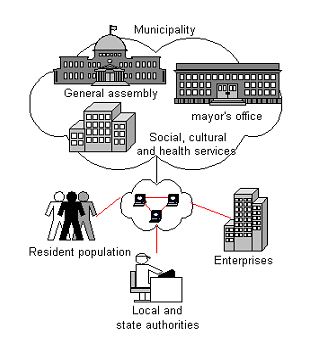
The "Demand Driven Information Tools" project
The project explores the steps of introduction and establishing e-administration and the opportunities of disseminating e-democracy in a more widen circle. The scope of duties in the project is multidisciplinary, to successfully reach the predetermined targets needs the cooperation of administrative specialists, jurists, administration-reengineering specialists, financial and computer specialists, sociologists. The participants of the project try to make an advance in the next areas:
Making reorganisational changes in the local government The three fundamental factors of public administration are autonomy, democracy and workmanship. The Hungarian rule of law (the Hungarian constitution, the local governmental law and the other related laws) ensures the fruition of this triad. The governing unit of the local governments is the general assembly, which members are selected by the citizens. The mayor is the chairman of the general assembly, and he is responsible for legitimate working of the local government. The mayor's office assists the work of local government, it stands for workmanship. The mayor's office manages the contact with the citizens (individuals, businesses, procuration issues, etc.), with the local governmental institutions (educational, cultural, health institutes, etc.) and with the state and local partner authorities (e.g. ministries, revenue office, police, fire department, supplier companies, etc.). The used communication language and method with the recited partners are slow, bureaucratic and hard, it requires serious and unnecessary investment from the citizens to understand. The present office routine is very formal, it differs from the everyday life. A theoretical and subsequently an experimental model of electronic public administration has been developed and is used for this project. The model includes all the important functions of a town/region. The project will be concluded by the installation of pilot model of electronic public administration in the region of Kaposvár, a city in southern Hungary, the region comprising about 100.000 inhabitants. The proposed system will consist of the inner and the outer parts. The inner part requires reengineering and automating the inner governmental processes. The outer part of the pilot system will be a customer-focused e-government portal. The inner and outer parts of the pilot system will be connected. The general public will be able to interact with the local government through the portal, fill out forms, submit them electronically, and than keep track the progress of the request (what is the status of the affair: registrated, waiting, finished, etc.)
The regional Kaposvár project as a key test-bed for national e-government efforts Main issues: linguistic interfaces for more democratic and more efficient servicing governance, legal problems of privacy, security and openness, including more direct democracy. Rethinking data unification caveats, automatic selection of private data from public interest information, control methods of preserving basic constitutional principles. Three languages are used: the natural language of the citizen used in communication with the administration. The second is the formal, logical language of the administrative procedure, the third a quasi-natural language on behalf of the administration used for dialog and decision. The first applies all achievements of other parallel research projects in natural language understanding enhanced with special vocabularies and phrases for each case-type. Similarly, for each case-type scenarios of situations, processes and decisions are stored and the linguistic analysis matches those, by words, phrases and full structures for machine understanding and decision support. The system has learning and an operational phase. Initially the system is proved on a great bulk of different texts, prepared by the local administration and will be used first of all for citizen consultation regarding the administrative procedure. In a further project not only written text but also voice understanding is foreseen. The revision of legal procedures is under consideration. It must follow the EU practice and future regulations, too.
Other documents about the project in hungarian:
|
|||||||||||||||
